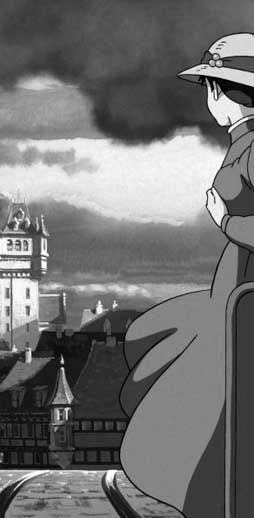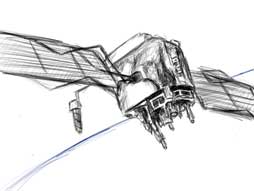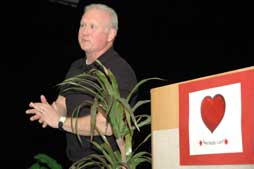By Judah Bucy/reporter
The U.S. Army is pushed to its limits right now, a university history professor said last week.
Dr. Adrian Lewis, department chair at the University of North Texas, presented Military Tactics from Vietnam to Iraq to a roomful of NW Campus history students Feb. 13.
Lewis said the U.S. spends more money on military technology than every other nation in the world combined.
“We thought that great technology would make this war [in Iraq] easy—we were wrong,” he said.
Only two students raised their hands when Lewis asked the audience how many supported the war in Iraq.
“I think going into Iraq was a bad idea; however, we are there now, and we cannot leave it in a mess,” he said.
When WWII ended by the dropping of the atomic weapons on Japan, the U.S. military officials thought the way wars would be fought was changed forever.
They thought wars would no longer be fought on the ground, but from bombs dropped out of the sky, Lewis said.
“From WWII forward, we have had a very distorted view of war,” he said.
When WWII ended, the U.S. had more than 8.8 million troops in the Army; however, just five years later, that number had been cut to 590,000, and the U.S. Air Force was receiving 50 percent of all of the military’s funding.
The Vietnam War was supposed to be the first war that would not be won with ground-based warfare, Lewis said.
“That war was supposed to be won with air power,” he said.
The actuality turned out to be quite the opposite, for the public knows many soldiers were killed in the Vietnam War—about 300 per week—a “staggering figure,” Lewis said.
A retired Army major, Lewis said air power has never demonstrated the ability to win a war, but for some reason, the U.S. keeps going back to it.
“The U.S. Army and Marine Corps were not supposed to win The Vietnam War,” he said.
Lewis also said the enemy was not thoroughly destroyed in Vietnam.
“The will of the American people was destroyed in Vietnam,” he said.
Lewis spoke harshly against tactics used at the beginning of Operation Iraqi Freedom and Operation Enduring Freedom. He said the U.S. had Osama Bin Laden surrounded at least two times, but instead of using its own ground forces, the U.S. called upon the Northern Alliance to take down Bin Laden.
This strategy, Lewis said, turned out to be “greatly flawed.” The Northern Alliance had no loyalty to the U.S., and Bin Laden escaped capture.
“If we had done things right, Osama would be sitting in a U.S. prison right now,” he said.
In a more somber mood, Lewis spoke of soldiers who have served far more than their fair share of duty in war.
“Some soldiers are on their third tour in Iraq,” he said. “It’s not fair—it’s not who we are as a people.”
The crowd applauded as Lewis left the stage.
Lewis holds a doctorate in European and military history from the University of Chicago.



























